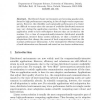Free Online Productivity Tools
i2Speak
i2Symbol
i2OCR
iTex2Img
iWeb2Print
iWeb2Shot
i2Type
iPdf2Split
iPdf2Merge
i2Bopomofo
i2Arabic
i2Style
i2Image
i2PDF
iLatex2Rtf
Sci2ools
124
click to vote
PARA
2000
Springer
2000
Springer
Runtime Adaptation of an Iterative Linear System Solution to Distributed Environments
Abstract. Distributed cluster environments are becoming popular platforms for high performance computing in lieu of single-vendor supercomputers. However, the reliability and sustainable performance of a cluster are difficult to ensure since the amount of available distributed resources may vary during the application execution. To increase robustness, an application needs to have self-adaptive features that are invoked at the runtime. For a class of computationally-intensive distributed scientific applications, iterative linear system solutions, we show a benefit of the adaptations that change the amount of local computations based on the runtime performance information. A few strategies for efficient exchange of such information are discussed and tested on two cluster architectures.
Applied Computing | Available Distributed Resources | Distributed Cluster | PARA 2000 | Runtime Performance Information |
Related Content
| Added | 25 Aug 2010 |
| Updated | 25 Aug 2010 |
| Type | Conference |
| Year | 2000 |
| Where | PARA |
| Authors | Masha Sosonkina |
Comments (0)

